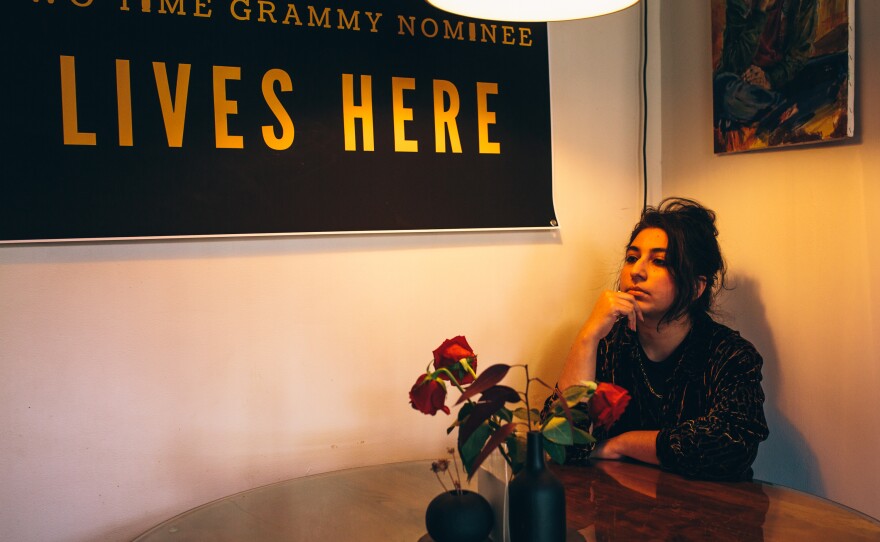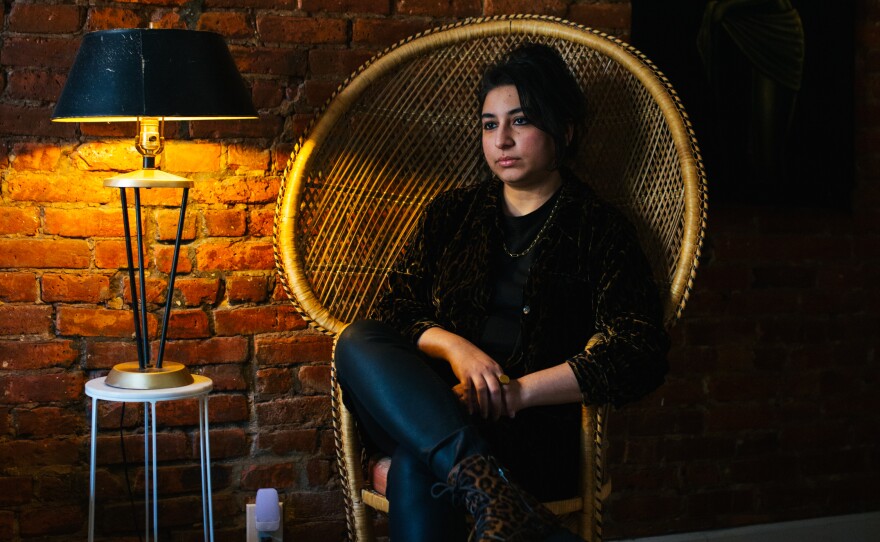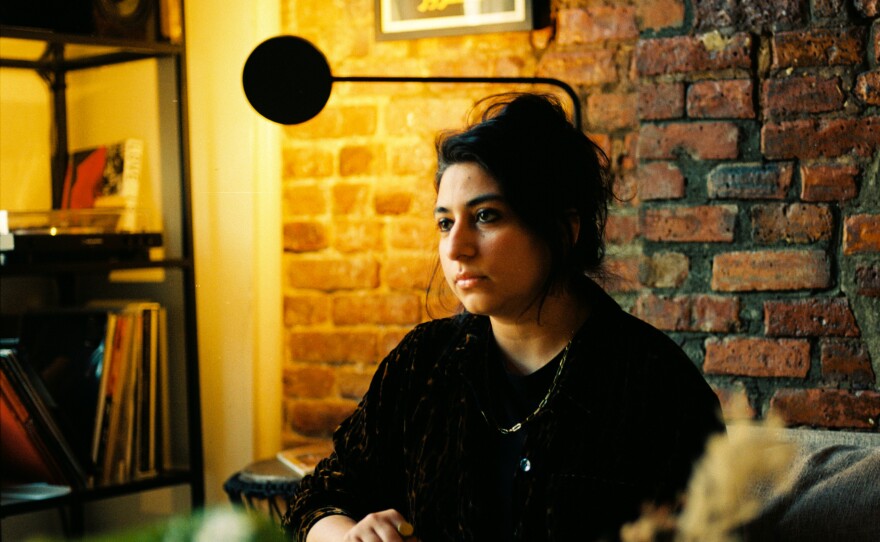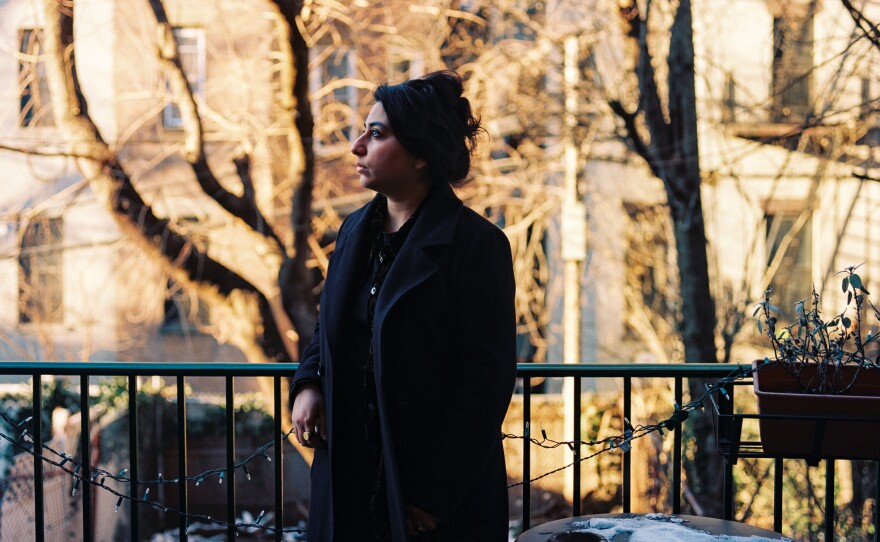This is part of a series of features from All Things Considered on first-time Grammy nominees, ahead of the April 3 awards. You can read and listen to the profiles on Saweetie, Jimmie Allen and Barlow & Bear.
Remnants of a party linger inside Arooj Aftab's Brooklyn brownstone on a gloomy winter day: Slightly deflated balloons in metallic purple, red and gold hover against the ceiling of her living room, and a well-used ashtray sits on her patio table.
Against one wall, a banner reads "TWO TIME GRAMMY NOMINEE LIVES HERE" in big, bold letters. It is mid-December, just a few days after she heard the news.
"I did not get this myself and, like, put it up," Aftab says, chuckling as she points to the banner. Her friends had bought it for the party they threw to celebrate Aftab's nominations for Best New Artist and Best Global Performance for her song "Mohabbat."
Aftab has lived in this apartment for more than six years. She shares it with her partner, roommate, and Tuna, a feral cat she took in as her own. She has spent a lot of time here, ruminating, writing, rehearsing and occasionally recording music— some of which is on her 2021 album Vulture Prince.

"I'm very complacent just being inside," she says. "I'm not, like, one of those people who is like, 'I didn't go out today, oh my God, I feel crazy.'"
But she is intentional about the objects she surrounds herself with — like a patterned, hand-woven rug from her hometown of Lahore, Pakistan — objects that she says evoke "mysticism and chill."
Aftab's heritage and penchant for mysticism also come through in her music, which is rooted in the ancient Sufi tradition made famous by poets like Rumi. Sufi music is traditionally thought of as devotional and repetitive, allowing humans to connect with a higher power. Aftab's definition is looser.
"To me, what characterizes Sufi music is minimalism and cyclical motifs in the songs, in the writing of the song structure," she says. "Anything that evokes a sense of peace, even if it's very fast paced."
For Aftab, it isn't just the sound of the music that qualifies it as Sufi, it's what it does to you and where it takes you. She has spent more than a decade digesting some of the ancient poetry that is featured in her music.
"It takes that long, really, to sit with poetry that is that old and understand it and absorb it like proper osmosis, and really feel it in your own body," she says.

Her work infuses that ancient poetry with new music, especially on Vulture Prince, which is Aftab's third album. It spans seven songs that range from melancholy to playful, but they are always bold in a way that reflects the deep history that inspired them.
One critic described her lyrics as "humid," to which Aftab responded with her signature belly laugh and joked that the descriptor made her feel like a wet sock.
"The nice thing is that it occupies many different spaces for different people, and also for me, right? It's like an amalgamation of all of my inherited heritages," she says.
Heritages that include Pakistani and Sufi traditions, but also jazz, folk, and minimalist music. She draws inspiration from the likes of Abida Parveen — "the queen of Sufi music" — famed jazz singer Ella Fitzgerald, and minimalist composer Terry Riley. Yet while her influences span genres and generations, Aftab says she didn't listen to any music while making her latest album. "It distracts you from your own voice," she sums up neatly.
Aftab was born to Pakistani parents in Saudi Arabia. When she was 10, her family returned to Lahore where she spent her teens, until she moved to the U.S. to study music production and engineering at Berklee School of Music. She has lived in New York for the past 15 years, immersed in the jazz scene. But wherever she was, music was always a central part of her life.
"Pakistanis, on a cultural level, are never without music, never without poetry, never without some form of art or dance," she says.
She recalls growing up around parents and family friends exchanging and playing music together. "It's part of the tapestry. It's just everywhere."

Of the seven songs on her latest album, six are in Urdu and one in English. Aftab says she has finally reached a place where she has mastered expressing herself through singing in Urdu.
"I've barely just scratched the surface of [singing in English]," she says. "I feel like as a vocalist, the register in which your voice actually lives changes based on the language you're singing it in. There's diction, there's breath ... then there's the emotion and there's the delivery of the words."
Aftab is a self-described perfectionist. But she is keen on bringing fun to an often pensive form of music. Originally written by early 20th century poet Hafeez Hoshiarpuri, many artists, including Mehdi Hassan and Jagjit Singh, have performed renditions of the song "Mohabbat" (which is one of many words for "love" in Urdu). Aftab describes the song as "sad and depressing" but says she interpreted some humor in the lyrics that she was able to infuse into her version. "[It has a] comedic aspect to it that I've always found resonated with me ... and I've never really seen it in any version that anyone else has sung," she says.
Aftab brings that kind of levity and contradiction to the entire conversation about her music and the Grammy nominations, and she seems wary of defining her work too precisely. She is elated that her music is being recognized for the highest award in the music industry, while also being cynical of a world that often recognizes musicians by their accolades. And while Aftab is proud to be the first Pakistani woman to be nominated in the Grammy's Best New Artist category, she shrugs at the qualifier, pointing out that she has now spent more time in the U.S. than in Pakistan.
"To be nominated as a best new artist, for me, feels like all this work I've done, not to be otherized and not always be thought of as 'new age' or 'world music' or 'international folk,'" she says.
For Aftab, the lack of qualifiers in the Best New Artist category is a monumental triumph in itself.

The audio for this story was produced by Jonaki Mehta and edited by Christopher Intagliata. The article was written by Jonaki Mehta.
Copyright 2024 NPR









